Dear Florida Climate Center Friends,
We'd like to present you with the May 2014 edition of our newsletter. In this newsletter, you'll find our monthly climate summary, a list of special events that our staff attended, some pictures, and more. If you have any questions, please email us at climate@coaps.fsu.edu.
Thanks,
The Staff of the Florida Climate Center
 |  |  | David Zierden
State Climatologist | James O'Brien
Professor Emeritus | Melissa Griffin
Asst. State Climatologist |
|
April Climate Summary for Florida
The Florida Climate Center's April 2014 Florida Climate Summary is now available. The summary provides an analysis of temperature and precipitation trends across the state, along with data on hazardous weather, drought, the impacts of the weather and any records tied or broken for the month. During April, average temperatures and rainfall totals varied across Florida. ENSO-neutral conditions are continuing in the equatorial Pacific. The Climate Prediction Center (CPC) predicts above normal temperatures and normal precipitation for the state through July. Past summaries are archived here.
| April average temperatures and departures from normal (°F) for select cities. |  |
| April precipitation totals and departures from normal (°F) for select cities. | 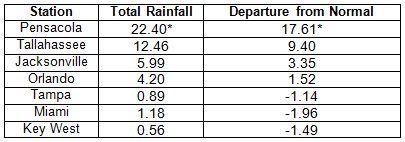 |
*Values are estimated due to system failure during the flood event on April 29-30, 2014.
| A graphical depiction of the monthly rainfall departure from normal (inches) for April (courtesy of NOAA, NWS). | 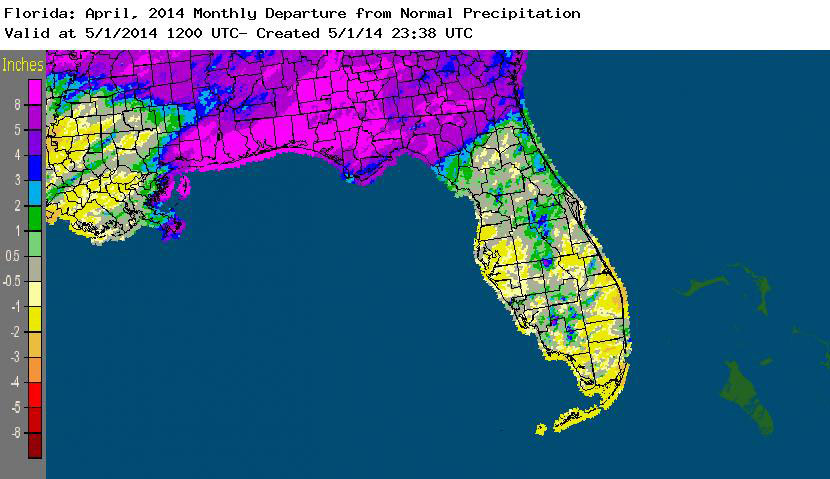 |
|
|
SERCC TAC Meeting
At the beginning of April, Melissa Griffin, Assistant State Climatologist, attended the Southeast Regional Climate Center (SERCC) Technical Advisory Committee (TAC) Meeting in Raleigh, NC. During the three-day event, members of the regional climate center and representatives from climate offices in the region presented on how each state was impacted by winter weather, new research, and collaborative projects being conducted. Discussions were also had with two meteorologists from WRAL-TV (Raleigh), Greg Fishel and Nate Johnson, on challenges in communicating probabilities and risks. Jerry McMahon, from the Southeast Climate Science Center, and Steve McNulty, from the newly formed Southeast USDA Climate Hub, talked with those in attendance about future collaborative opportunities.
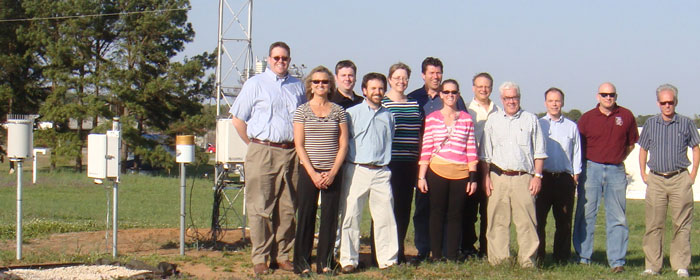
|
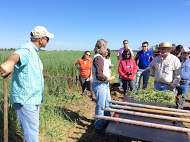
Area Farmers Learn About Cover Crops
The University of Florida/IFAS Extension and USDA's Natural Resource Conservation Service hosted a field day on April 1st in Jefferson County, Florida. The program called "Discover the Cover" demonstrated the effectiveness of high-residue cover crops in conjunction with the typical row crops grown in North Florida, such as corn, peanuts, cotton, and soybean. The benefits of actively managed cover crops are many, including improved soil health, erosion prevention, conservation of soil moisture, and reduced runoff from heavy rain events. In short, the cover crops help make dryland farming more resistant to climate variations, such as heavy rainfall events and periods of drought during the growing season. Many of the participants are also involved with the "Tri-State Climate Working Group for Row Crop Farmers." State Climatologist David Zierden attended the field day and discussed management strategies for the cover crops based on seasonal climate forecasts and El Niño/La Niña variability.
|
|
BRACE TAG Department of Health 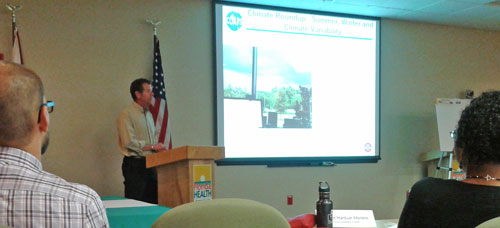
State Climatologist David Zierden and Assistant State Climatologist Melissa Griffin attended a technical advisory group (TAG) meeting for their collaborative effort with the Florida Department of Health (DOH) on their multi-year Centers for Disease Control and Prevention's project called Building Resilience Against Climate Effects (BRACE). The TAG meeting, held in Orlando on April 15th, included an update on current research within the project, along with technical presentations on Florida's climate, information on the possibility of an El Niño Winter, current data available through climate modeling, hazard and health profiles, and a review of other state adaptation plans. As the project enters its second year, the Florida Climate Center will continue to support the DOH in obtaining and using of climate data and information.
|
 FSU Hosts National Academy of Sciences Meeting
The National Academy of Sciences Board on Atmospheric Science and Climate (BASC) met at Florida State University on April 22nd and 23rd. This advisory board holds one of their meeting each year at a prominent university to stay in tune with the latest academic research and applications. This year's meeting at FSU was spearheaded by former University President Eric Barron, who was also a former board chairman. Those on the board included chairman Antonio Busalacchi, an FSU alumnus, and David Robinson, New Jersey State Climatologist.
FSU faculty and graduate students presented research on a variety of topics, including climate variability and climate change, extreme events such as extratropical cyclones and hurricanes, and lightning. The Florida Climate Center presented in a session on regional climate services. In that session, State Climatologist David Zierden gave an overview of the Florida Climate Center and how we provide climate services at the local and state level, focusing on stakeholder interactions. Assistant State Climatologist Melissa Griffin presented on education and outreach of weather and climate science through a host of different projects.
|
|
Upcoming Events
May 7, 2014:
USDA/NIFA Program Planning Meeting in Tallahassee, FL
May 7-9, 2014:
Southeast Climate Consortium Spring Meeting in Tallahassee, FL
May 19-22, 2013:
Managing and Utilizing Precipitation Observations from Volunteer Networks in Estes Park, CO
June 8-11, 2014:
21st AMS Conference on Applied Climatology in Westminster, CO
July 9-12, 2014:
Annual Meeting of the American Association of State Climatologist in Stevenson, WA
|
|
Special Report: Humidity
As the State Climate office for Florida, we often get questions about living with high humidity. Many people suffer from respiratory illness or other health problems that are affected by humidity and they are trying to find a suitable climate to move to. The most common questions are:
Is Florida the most humid state in the nation?
Is there a part of Florida that is less humid than others?
To help answer these questions, the office has put together a report with some in-depth information on quantifying humidity and other common myths. You can read our special report, at the following link:
http://climatecenter.fsu.edu/topics/humidity
|
|
About Us
The Florida Climate Center is part of a three-tiered system of national, regional, and state climate offices, including NOAA's National Climatic Data Center and the Southeast Regional Climate Center. The Florida State Climatologist and other staff at the Florida Climate Center provide the following information and services to the people of Florida:
· Climate Data:
Historical weather observations for weather stations throughout the state of Florida. We are able to provide data for most stations from 1948-present.
· Climate Information:
Long-term historical averages for various stations, climate divisions, and the entire state.
· Extreme Event Records:
Information and analyses on extreme events such as freezes, droughts, floods and hurricanes.
· Special Analysis:
With their vast knowledge of El Niño, La Niña and climate variability, the State Climatologist and staff can offer expert insight into Florida's climate trends.
· Outreach:
Activities, presentations, and workshops that inform and educate the people of Florida about current and emerging climate issues. We also coordinate volunteers for the Community Collaborative Rain, Hail & Snow Network (CoCoRaHS).
More About Us
|
|